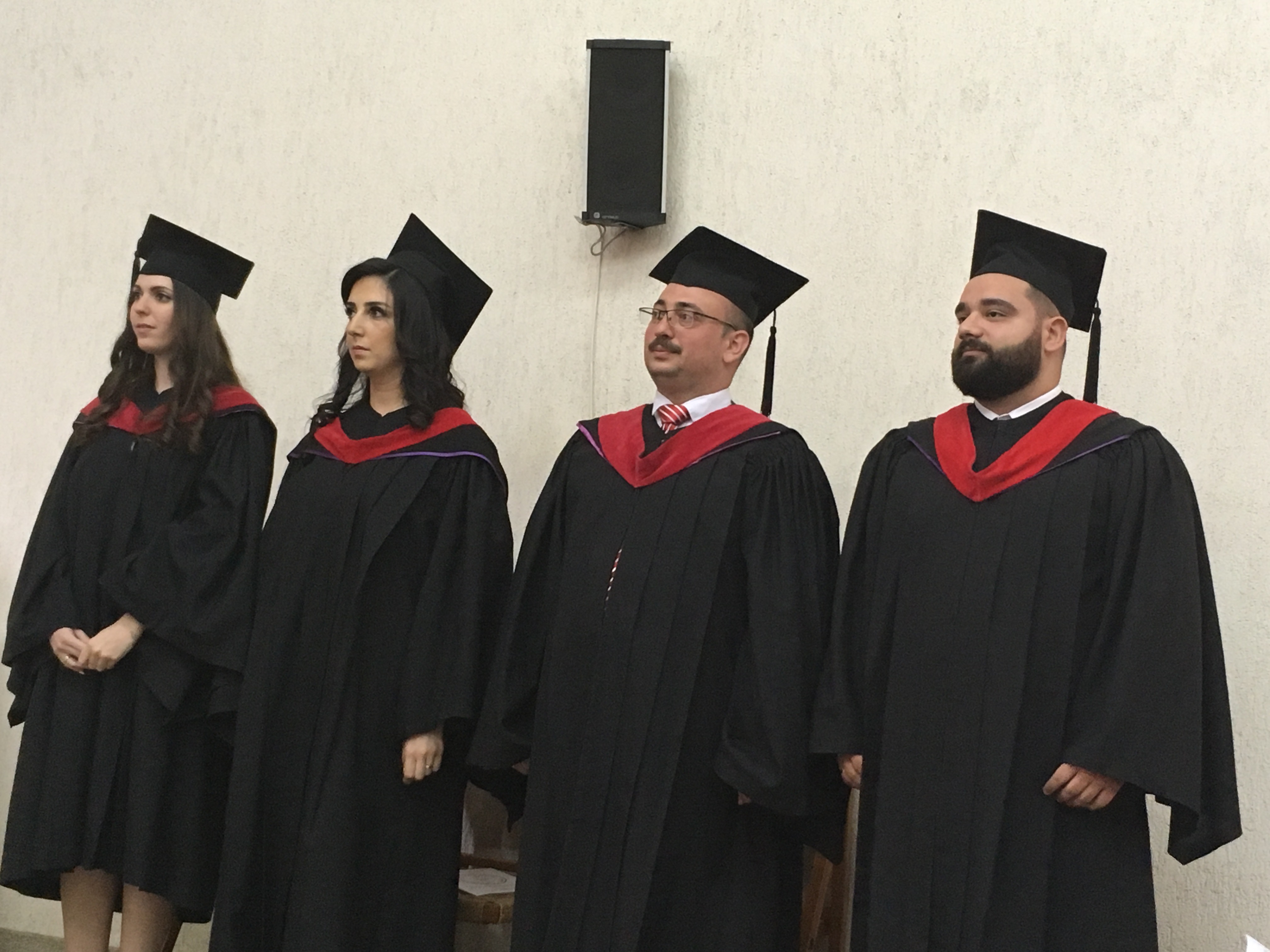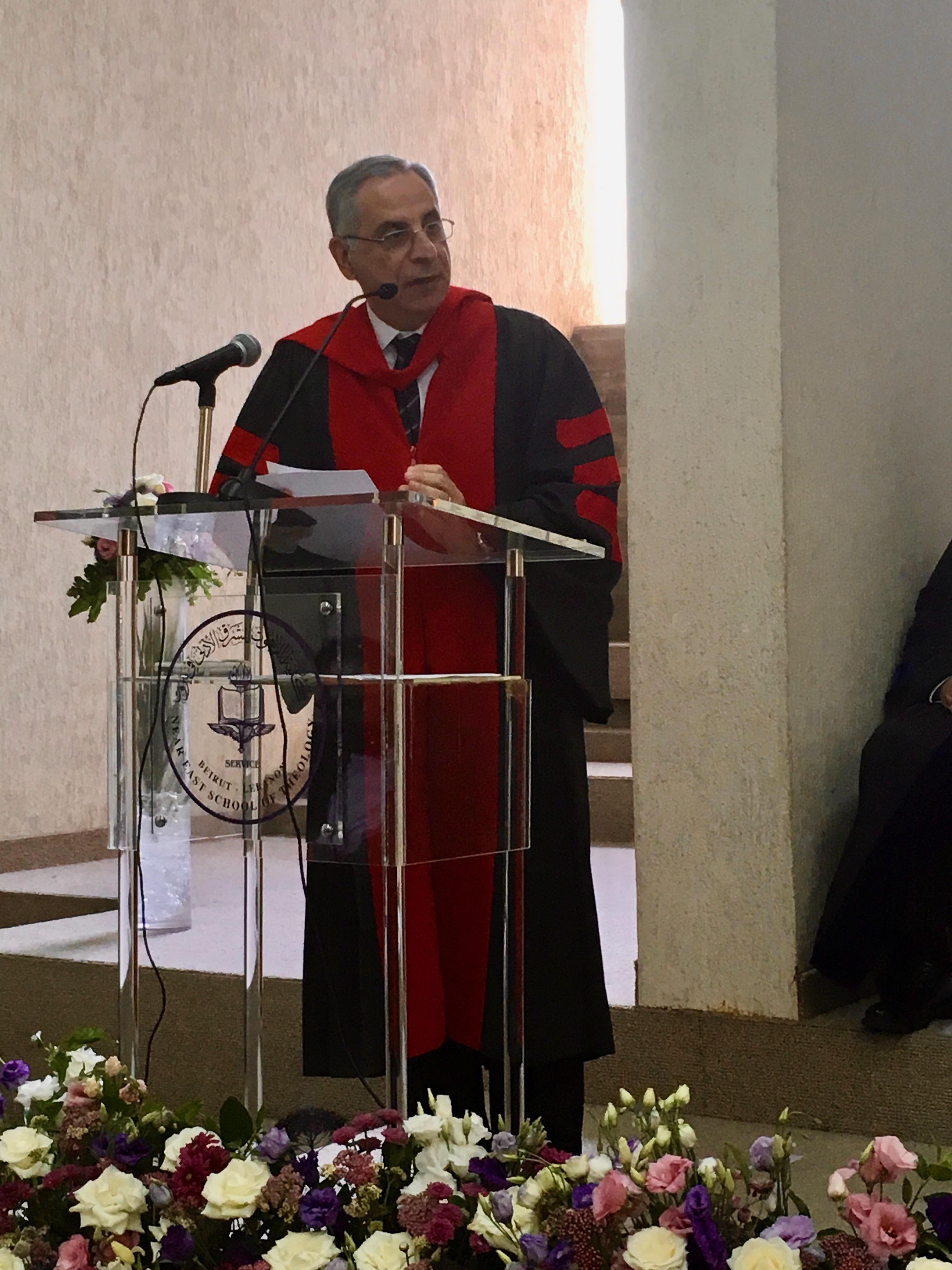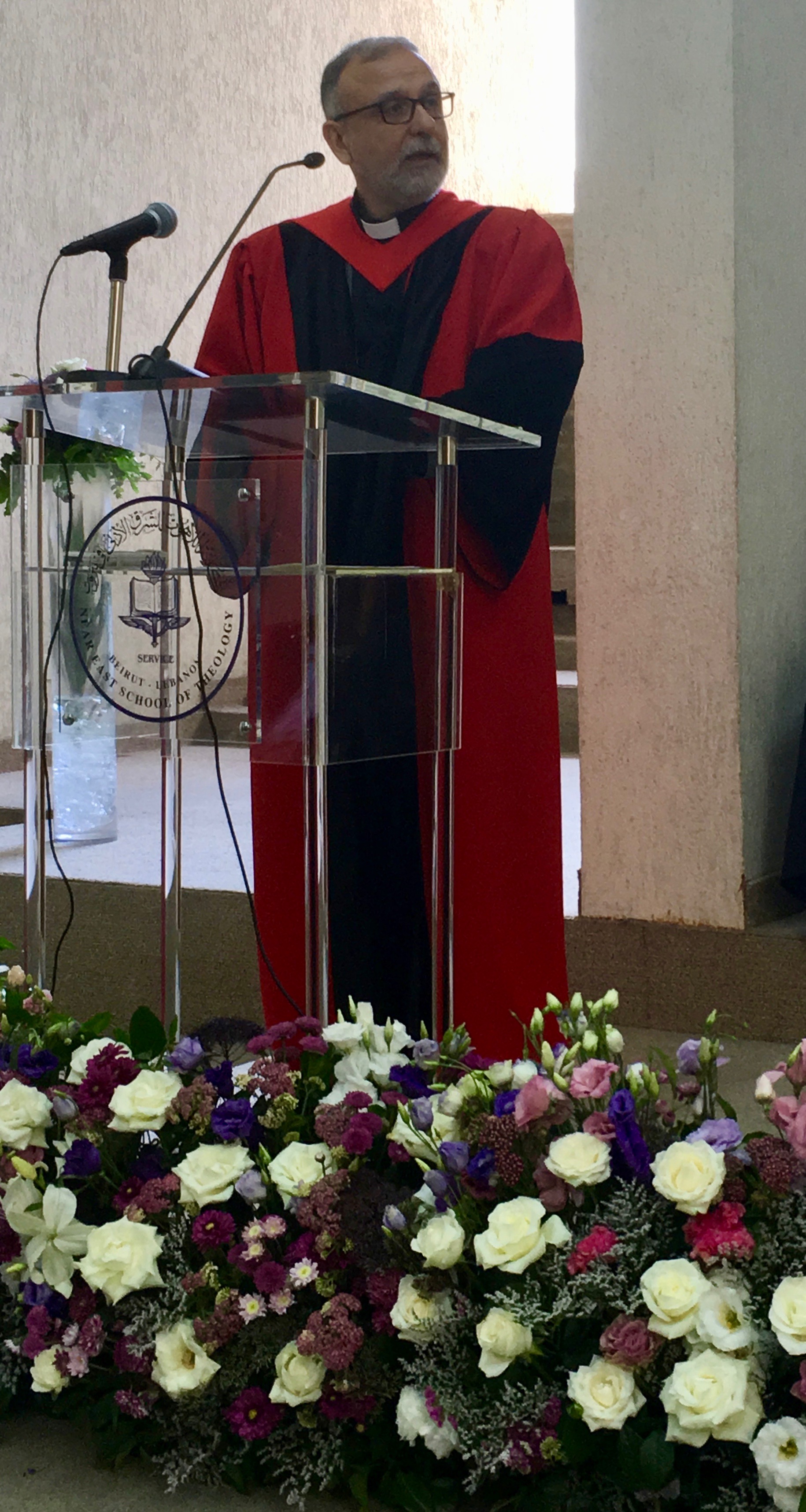Letter from Elmarie and Scott Parker, serving as regional liaison for Syria, Lebanon and Iraq (Elmarie) and as Associate for Ecumenical Partnerships (Scott)
July 2019
Write to Scott Parker
Write to Elmarie Parker
Individuals: Give online to E200504 for Scott and Elmarie Parker’s sending and support
Congregations: Give to D507569 for Scott and Elmarie Parker’s sending and support
Churches are asked to send donations through your congregation’s normal receiving site (this is usually your presbytery)
The Lord God has told us what is right and what God demands:
See that justice is done, let mercy be your first concern, and humbly obey your God.
Micah 6:8 (CEV)
I was deeply moved and challenged as I listened to the charge given by Dr. George Sabra, President of the Near East School of Theology (NEST), to the four graduates — two women and two men, all from Syria and all returning to serve the church in Syria. I’d like to share a good part of that charge with you here:
“Dear graduates, you all come from the Middle East, from Syria, born and raised, but also from Lebanon, where you have lived and studied. Well, neither Syria nor Lebanon figure anywhere among the best countries of the world, nor among the best to raise your children in, nor among the safest countries to live in. It is very likely that they rank somewhere at the very end of such listings. Yet, it is in these countries, at the very end of every list, that you live, have studied theology, and where you will continue to live and work.
“A different type of report, the Holy Scriptures, tells us that it is precisely in this region of the world that is farthest of all from the best country to be that God chose to reveal Himself; it is in this region of the world that God formed a people and chose to accompany them; it is this region of the world that God chose for his Son to be born and to be raised in, in order to fulfill God’s mission to the whole world.
“You have been trained in what is not the best countries in the world; you have been spiritually formed and theologically shaped in what is not the best countries to be raised in; and you will be serving in very unsafe countries, but your theological training and spiritual formation are the best and most excellent, not because of the grades you got, or the seminary that you studied in, or the degrees you have acquired, but in so far as you will serve and dedicate your lives to precisely the countries that are not the best in the world, not the most children-raising friendly, and not the safest.
“For our part, as a theological seminary, we measure our success in theological education, not simply by our academic standards and qualified teaching staff, or the number of volumes we have in our library, or the use of the latest technology in learning tools, but most importantly by whether those who study here remain to serve and persevere in what are not the best places to be, and so identify with, support, console, encourage, lead and minister to their brothers and sisters in those places which the world reports scorn and rank last, but which figured first on God’s list.“So, congratulations, dear graduates, not just because you received your degrees and finished your studies successfully, but because you will also put your education to use, and you will minister and serve where it is most needed in this world-forsaken, but not God-forsaken, region.”
The commencement speaker, the Rev. Dr. Nadim Nassar (a 1988 NEST graduate), director of the Awareness Foundation in the United Kingdom (an international charity that builds peace through educating, equipping and empowering children and young people in Syria and Iraq to be agents of love and reconciliation), expanded on the four key missional practices needed in order to minister and serve in such a context. He shared:
“We live in a region that carries deep wounds that have been inflicted on it throughout its history — and in the present. These wounds are existential, breaking and separating communities and families, creating hatred and hostility, and causing heartache for millions across the Near East. As we join our hands together with you, we embark on a journey of healing, helping our communities to be restored, to fulfil their potential, so that everyone in them can live better lives.
“I want to suggest four remedies which can help you to achieve this.
“Firstly, to recognise and celebrate our cultural, religious and social diversity and to give dignity to our differences so that no-one could use this diversity to create division and conflict….
“Secondly, it is essential to have a profound understanding of the culture of the people whom we are serving …. Then … [a]nything can become a tool for us to use in our service of our people.
“Thirdly, let us never forget the manifesto of our Lord Jesus Christ when He visited His city of birth, Nazareth (Luke 4:18-19). This reminds us that we should never lose sight of the poor and the needy in our communities. Throughout His ministry, our Lord always attended to those who were the most vulnerable in society. Let’s make His manifesto our manifesto as we work to heal our communities.
“Fourthly, above all else, the most powerful healing remedy that everyone in the Near East can appreciate is the only commandment which the Lord left with His disciples: LOVE [John 13:34-35). How can we talk about love without making it sentimental? How can we bring that value back as a living, breathing power that can heal all broken relationships? The only way is to practise it in our lives with a deep conviction that that love which is empowered by hope can transform lives.”
In reflecting on the encouragement and perspective these two seasoned leaders offered to these graduates just embarking on their leadership journeys in the life of Christ’s church in the Middle East, I was struck by how deeply it resonates with what seems to be emerging from Presbyterian World Mission’s multi-month journey of strategic discernment carried out in conversation with global partners and PC(USA) members and leaders, and with Matthew 25:31-46 and the PC(USA)’s commitment to live more deeply as a Matthew 25 Church. I’ve been most impacted by these particular emerging themes and see them made visible in so much of the work our partners in Iraq, Syria, and Lebanon embody every day: mutuality in ministry, ministry with those who are the most vulnerable, and ministry that seeks to transform structures of injustice that oppress especially the most vulnerable.
In our next few letters, we’d like to share with you these emerging themes in our Middle Eastern context. Scott and I are looking forward to continuing in this journey of learning from our friends here in the Middle East as they persevere in ministering in this world-forsaken, but not God-forsaken, region. And we look forward to continuing to share this journey with you, with hopes that the life of our sisters and brothers here may continue to encourage you in your life and work and ministry in the USA.
Thank you again for sharing in this journey with us. Your partnership through prayer, conversation, hospitality during our recent time of traveling and speaking in the USA, solidarity visits with us and our partners here in the region, and financial support remain a deep encouragement to us.
Elmarie and Scott
![]() You may freely reuse and distribute this article in its entirety for non-commercial purposes in any medium. Please include author attribution, photography credits, and a link to the original article. This work is licensed under a Creative Commons Attribution-NonCommercial-NoDeratives 4.0 International License.
You may freely reuse and distribute this article in its entirety for non-commercial purposes in any medium. Please include author attribution, photography credits, and a link to the original article. This work is licensed under a Creative Commons Attribution-NonCommercial-NoDeratives 4.0 International License.
Tags: context, George Sabra, graduation, injustice, lebanon, love, Matthew 25, Middle East, ministry, Nadim Nassar, nativity, Near East School of Theology (NEST), syria, vulnerable
Tags: Elmarie Parker


